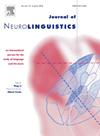Investigation of long- and short-term adaptations of the bilingual language system to different language environments: Evidence from the ERPs
IF 1.2
3区 心理学
Q2 LINGUISTICS
引用次数: 0
Abstract
Does a long-term stay in a foreign language country affect word retrieval in our native language? And if so, are the effects reversible? The present study explored the neural correlates of single-word production in the native language and their dynamics due to two types of changes in the language environment: long-term immersion in a foreign language (L2) environment and short-term reimmersion in a native language (L1) environment. We tested Polish-English migrants living in the UK (L2 environment) for an average of ten years and Polish-English controls living in Poland (L1 environment). All participants performed an L1 picture-naming task while we recorded their electrophysiological responses. The migrants were tested before and after visiting the L1 environment, while the controls were tested twice in their L1 environment. Our focus was on two event-related components previously associated with the ease of lexical access: P2 and N300. We found no modulations related to N300, but some in the P2 time window, although their distribution was more frontal than previously reported. There was no main effect of the long-term immersion in the L2 environment, suggesting that the effectiveness of producing words in L1 was similar across the two groups. However, the short-term change in the language environment modulated the early positivity in migrants: smaller frontal positivity was reported in response to picture naming after the short reimmersion in the L1 environment than during the L2 immersion. These results indicate that the short-term changes in the language environment induce modulations in the neural response, which may reflect higher proactive control applied in L1 production during L2 immersion and its reduction after short-term L1 immersion.
双语系统对不同语言环境的长期和短期适应的调查:来自erp的证据
长期呆在外语国家会影响我们用母语检索单词吗?如果是这样,这些影响是否可逆?本研究探讨了长期沉浸在外语(L2)环境和短期再沉浸在母语(L1)环境中两种语言环境变化对母语单字生成的神经关联及其动态影响。我们测试了生活在英国(L2环境)的波兰-英语移民平均10年,以及生活在波兰(L1环境)的波兰-英语对照。所有参与者都完成了L1图片命名任务,同时我们记录了他们的电生理反应。迁移者在访问第一语言环境之前和之后分别接受了测试,而对照组在他们的第一语言环境中接受了两次测试。我们的重点是两个与事件相关的组件:P2和N300。我们没有发现与N300相关的调制,但在P2时间窗中发现了一些调制,尽管它们的分布比以前报道的更为正面。长期沉浸在第二语言环境中没有主要影响,这表明在两组中产生第一语言单词的效果是相似的。然而,语言环境的短期变化调节了移民的早期积极性:在短暂的再浸入L1环境后,对图片命名的反应的额叶积极性比在浸入L2环境时要小。这些结果表明,语言环境的短期变化诱导了神经反应的调节,这可能反映了在第二语言浸入过程中对母语产生的主动控制增强,而在短期L1浸入后这种主动控制减弱。
本文章由计算机程序翻译,如有差异,请以英文原文为准。
求助全文
约1分钟内获得全文
求助全文
来源期刊

Journal of Neurolinguistics
医学-神经科学
CiteScore
3.90
自引率
5.00%
发文量
49
审稿时长
17.2 weeks
期刊介绍:
The Journal of Neurolinguistics is an international forum for the integration of the neurosciences and language sciences. JNL provides for rapid publication of novel, peer-reviewed research into the interaction between language, communication and brain processes. The focus is on rigorous studies of an empirical or theoretical nature and which make an original contribution to our knowledge about the involvement of the nervous system in communication and its breakdowns. Contributions from neurology, communication disorders, linguistics, neuropsychology and cognitive science in general are welcome. Published articles will typically address issues relating some aspect of language or speech function to its neurological substrates with clear theoretical import. Interdisciplinary work on any aspect of the biological foundations of language and its disorders resulting from brain damage is encouraged. Studies of normal subjects, with clear reference to brain functions, are appropriate. Group-studies on well defined samples and case studies with well documented lesion or nervous system dysfunction are acceptable. The journal is open to empirical reports and review articles. Special issues on aspects of the relation between language and the structure and function of the nervous system are also welcome.
 求助内容:
求助内容: 应助结果提醒方式:
应助结果提醒方式:


